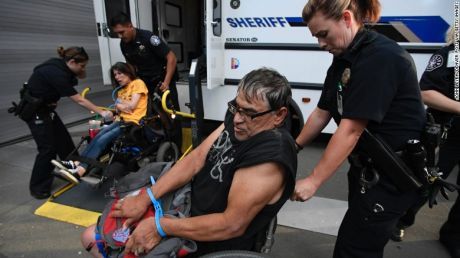News
You are here
Disabled people leading the resistance

August 7, 2017
Disability activists are back in the spotlight again thanks to Trump’s attacks on the Affordable Healthcare Act. The disability rights group ADAPT has been credited with helping to lead the fight against Trumpcare since the first version of the Republican plan was introduced on June 22. Scores of organized disabled activists have been arrested on Capitol Hill and at senators’ offices back in their home states, demanding no cuts to Medicaid.
Medicaid is a significant part of the US health care system. It was created at the same time as Medicare, signed into law by President Lyndon Johnson in 1965. It has changed, and grown, over its more than half-century in existence. Medicaid provides insurance coverage to the poor and disabled. According to a recent analysis by the Congressional Research Service, Medicaid pays for 15 percent of all health care in the United States, including half of all births, 40 percent of children’s health care and two-thirds of all Americans living in nursing homes. It also covers almost half of all long-term services and supports. That program provides critical, daily support for people living with disabilities. Without that, many would be unable to work and participate in their communities, and some people would die.
Here in Canada, many assume that our health care is untouchable, but in truth, cuts to healthcare have been steadly increasing, and the people who need that assistance the most are the first to feel those cuts.
With all this resistance happening, many people are looking for an opportunity to join in, and we’ve got a great suggestion. Join us for the 7th annual Toronto Disability Pride March on Saturday September 23 at Queen’s Park. The purpose of this event is to address the intersectional nature of disability and ableism, while creating possibilities for disability rights and advocacy through visible and inclusive community action. The march builds recognition of the value of people with disabilities, along with recognition of their struggles fighting against ableism and other forms of oppression.
ADAPT protesters are showing we can fight for disability rights, and we can’t afford to wait until our lives are on the line.
Section:









